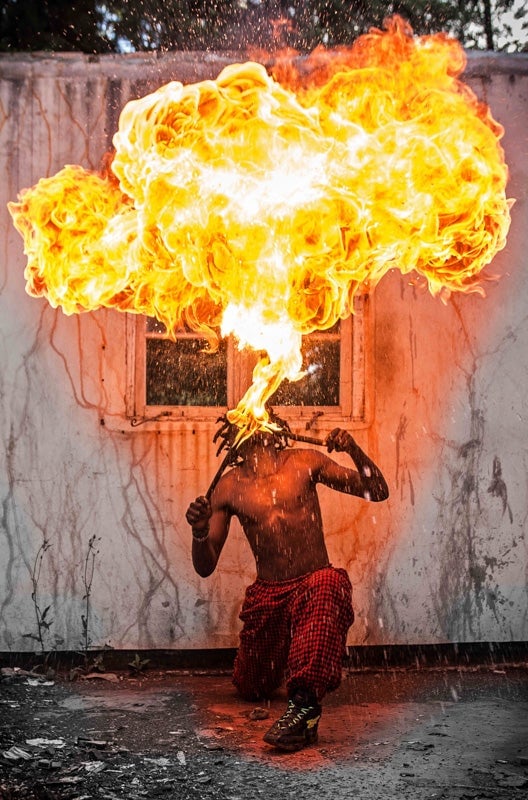Africa’s first crypto art collections have investors and creators feeling optimistic
African art sales, though they are on the rise, still currently account for less than 1% of the $50 billion global art market. What if there was a way for African artists to profit from their work in perpetuity while also growing their piece of the pie?


African art sales, though they are on the rise, still currently account for less than 1% of the $50 billion global art market. What if there was a way for African artists to profit from their work in perpetuity while also growing their piece of the pie?
This was one of the major motivations for Kenyan-based award-winning photographer and filmmaker, Rich Allela, to auction one of the continent’s first crypto art collections using non-fungible token (NFTs). His work is facilitated by Picha Images, a digital media company which launched one of the first crypto art NFTs on the continent. The auction is running from April 26 to mid-May, and is hosted on OpenSea, one of the world’s largest NFT digital marketplaces.

Allela’s work, including the images in this collection, focus on African culture and heritage, especially documenting cultures that are at the threat of disappearing due to modernization. He rewrites the African narrative and is no stranger to innovation, having incorporated augmented reality at one of his exhibitions in 2019 in Nairobi.
NFTs give assets a unique digital identifier that enables ownership and transfers to be tracked on a blockchain. Even if the digital image connected to an NFT itself can be easily copied, the NFT cannot be duplicated or interchanged with another. These aspects make them unique and traceable thus creating the scarcity needed to make them attractive to collectors.
For artists, the major attraction is in using blockchain technology that enables a network of computers to independently and reliably record and verify transactions. This means that artists can potentially get compensated every time their work is used or resold. (Learn more about how NFTs work in our complete guide to the subject.)
There have been impressive successes in this nascent sector. In February of this year, the NFT for a Nyan Cat meme sold for over $600,000. In the same month, the NFT linked to the first tweet by Twitter CEO, Jack Dorsey, sold at an impressive $2.7 million. Traditional art auction houses are also tapping into the market, in some cases auctioning crypto art, and in others accepting cryptocurrency as payment for physical artwork. In March, the NFT for a jpeg by a South Carolina-based artist known as Beeple was sold by the auction house, Christie’s, for a jaw-dropping $69.3 million.
Only a handful of people from Africa have ventured into this territory. Eliud Kipchoge, the Kenyan marathon world record-holder, recently sold NFTs for video highlights of his career for $50,000. In March of this year, Jacon Osinachi, a Nigerian artist, sold $75,000 worth of crypto art over a ten-day period.
African artists stand to gain a lot if they can harness the potential of such platforms. Artists will get full transparency on secondary buyers, as well as the ability to set up royalties in order to earn from their art in perpetuity. NFTS “are one of the few moments when Africa as a continent is starting off on an almost level playing field to the West,” Allela says. “The opportunities are open to anyone with a good internet connection and a willingness to learn.”
In addition to the potential monetary benefits, some are hopeful that crypto art could give artists more creative freedom and autonomy over their work. “For a long time, African artists have been creating what they believe the customer expects of African art. They know what sells well and they focus on that. It limits their creative freedom,” says Anne Kaluvu, a blockchain expert and lecturer at the Jomo Kenyatta University of Agriculture and Technology (JKUAT.) Kaluvu, who is also the founder of Women in Blockchain for Women Inclusion believes that while art is always subjective, the success of crypto art—what sells for tens of dollars vs. thousands of dollars—seems to be even harder to predict. As such, it might allow artists to carve out their own niche markets.

In an op-ed for Business Daily, Bitange Ndemo, a former high-ranking official at the Kenyan ministry for information and communications technology, highlighted the potential for NFTs to open up opportunities for historical, archived material that might be long forgotten in archives and museums. “In Kenya, for example, thousands of priceless pictures, films and stories of sports legends that define Kenya’s history are still being stored in media houses, with some rotting away,” he writes. “Yet they could easily create wealth for the country if they are digitized.”
The NFT marketplace should however be approached with caution. Artists will not only need to educate themselves on blockchain technology and perfect their craft, building their business acumen in the process, but also avoid major pitfalls, including scammers. Overnight success is not assured. NFTs also only account for less than 1% of the global art market.
Additionally, if any lessons can be learned from the experience on the continent of crypto art’s better known-cousin, cryptocurrency, it is this: Regulation on the sector might be slow in coming, but may potentially be highly restrictive. Fortune will favor the first movers.
While crypto art might be the newest, most exciting aspect of blockchain technology, Kaluvu believes that the real potential of this technology cuts across several issues plaguing the continent, including corruption. She says, “We as a continent are barely scratching the surface on what blockchain technology can do for us. Imagine if governments could harness the benefits of traceability that the technology offers. This could increase accountability in all sectors.”
Sign up to the Quartz Africa Weekly Brief here for news and analysis on African business, tech, and innovation in your inbox.